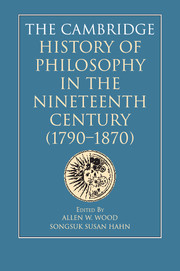Book contents
- Frontmatter
- Contents
- Contributors
- Preface
- Abbreviations
- Introduction
- I Philosophy in the Nineteenth Century
- II Logic and Mathematics
- III Nature
- IV Mind, Language, and Culture
- V Ethics
- VI Religion
- 16 Challenges to Religion in the Nineteenth Century
- 17 Three Types of Speculative Religion
- 18 The Defense of Traditional Religion, 1790–1870
- VII Society
- VIII History
- References
- Index
- References
17 - Three Types of Speculative Religion
from VI - Religion
Published online by Cambridge University Press: 05 December 2012
- Frontmatter
- Contents
- Contributors
- Preface
- Abbreviations
- Introduction
- I Philosophy in the Nineteenth Century
- II Logic and Mathematics
- III Nature
- IV Mind, Language, and Culture
- V Ethics
- VI Religion
- 16 Challenges to Religion in the Nineteenth Century
- 17 Three Types of Speculative Religion
- 18 The Defense of Traditional Religion, 1790–1870
- VII Society
- VIII History
- References
- Index
- References
Summary
There were numerous reformist efforts in religion before and during the nineteenth century, particularly among religious liberals who rejected biblical literalism, institutional authoritarianism, and theological supernaturalism. But the most philosophically important types of liberal revisionism were “speculative,” in a specific sense of the term. Though it is often used more loosely, its precise sense rests on the metaphor of the mirror (Latin speculum) reflecting and conforming its image to what enters its visual field. In speculative religion this visual metaphor is extended to the direct reflection of the divine in the human mind or will. Speculation is not just thinking about a putatively divine or absolute being. It is a reflexivity conforming thought and sensibility to what is divine.
The metaphor of speculation was common in late classical and medieval thought, particularly in neo-Platonic philosophy and Augustinian theology, as the mirroring of a prototypical reality in the mind or God in the soul. The Spinozistic intuition of the one substance, or the intellectual love of God, is speculative in this sense. Hegel introduced speculation into nineteenth-century philosophy, and others, not necessarily using the term, employed recognizable types of such speculative thinking in their conceptions of religion. Speculative religion does not proceed from alleged revelatory or miraculous events in history, though it may inform an interpretation of traditional teachings. Neither does it employ inferential reasoning from natural phenomena in the manner of deistic “natural religion.” Its reflexivity distinguishes it from the epistemic dualism of subject and object characteristic of empiricism: hence the disdain of empiricists for “mere speculation.” It is admittedly not the aim of speculative thinking to provide information about the empirical world, but rather to reflect what may be of ultimate interest to human self-understanding.
- Type
- Chapter
- Information
- Publisher: Cambridge University PressPrint publication year: 2012
References
- 1
- Cited by



